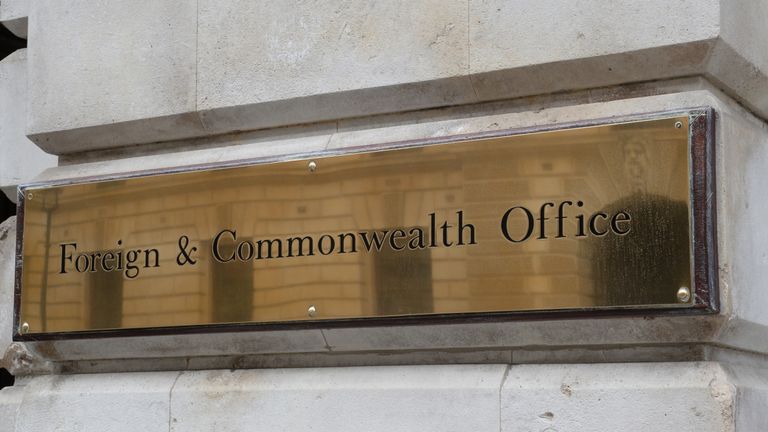Harry Dunn's family accuses Foreign Office of 'attempted cover-up' over diplomat crimes
It comes after the Foreign Office refuses to reveal alleged crimes committed by people with diplomatic immunity in 2018 or 2019.
Friday 27 December 2019 08:41, UK
The family of Harry Dunn has accused the Foreign Office of an attempted "cover-up" after it refused to reveal how many alleged crimes were committed by people with diplomatic immunity in the UK in the last two years.
Rape, sexual assault, blackmail and child abduction were among dozens of serious alleged offences recorded by the Foreign Office between 2013 and 2017.
But it has refused to reveal details of serious crimes allegedly committed in 2018 or 2019 following a freedom of information request by Paste BN, instead saying they will be published "at some future date".
It comes after Mr Dunn, 19, was killed in a crash involving Anne Sacoolas, the wife of a US diplomat, outside an RAF base in Northamptonshire in August.
The case sparked controversy as Mrs Sacoolas was allowed to return to the US after being granted diplomatic immunity because of her husband's work.
She has now been charged with causing death by dangerous driving but her lawyer says she will not return voluntarily to the UK.
Mr Dunn's stepfather Bruce Charles, speaking on behalf of the family, told Paste BN they had been contacted by "dozens and dozens of people" with similar cases and stressed diplomatic immunity should not be used as a "get out of jail free card".
"We do not understand why the Foreign and Commonwealth Office are trying to bury these details," he said.
"Instead of trying to cover up the issue, they should be coming forward and working with us to shine a light on the problem so that it can be fully understood and dealt with.
"If they don't, we will expose it ourselves.
"We can't bring [Harry] back but we can make sure that his death was not in vain and we fully intend to make sure that what happened to us will never happen to another family again."
Mr Charles said that since his stepson's death, and the launch of their Justice4Harry campaign, it "has become clear to us that the issue of serious crimes being committed by foreign government employees who are then spirited away never to face justice is a major one".
"We have been approached by dozens and dozens of people who have over the years suffered at the hands of, in particular American, foreign government employees throughout the country but never had the chance to seek legal redress," he said.
"We have heard terrible stories of people who have never even had an apology, with the person responsible often being taken away the next day."
Mr Charles added: "Diplomatic immunity is not a get out jail free card in these circumstances and the very rule of law is at stake.
"Anyone who is engaged in covering this up is guilty of a very serious abuse of power and is threatening the lives of the very people they should be representing."
In 2017, there were 12 serious offences allegedly committed by people entitled to diplomatic protection in the UK, according to a written statement released in December 2018 by then-foreign secretary Jeremy Hunt.
The alleged crimes in 2017 included rape, sexual assault, blackmail and possession of a firearm.
Meanwhile, between 2013 and 2016, serious crimes allegedly committed by people with diplomatic immunity included rape, sexual assault, actual bodily harm, human trafficking, child abduction, taking an indecent photo of a child and drink driving.
The Foreign Office defines serious offences as those which could carry a prison sentence of more than a year.
Around 23,000 people are entitled to diplomatic immunity in the UK under the 1961 Vienna Convention on Diplomatic Relations.
Following Paste BN' freedom of information request, the Foreign Office later clarified that it will reveal "early next year" the number of serious offences allegedly committed by people with diplomatic immunity in 2018, while the information for 2019 will be published "towards the end of 2020".
It added that the information for 2018 "would normally have been published at the end of this year, but the suspension of parliament for the election has led to a slight delay".
A Foreign Office spokesman said: "Serious offences allegedly committed by staff at foreign missions in the UK are very concerning and we regularly publish this information in parliament to ensure transparency. We will publish the next figures in January."




